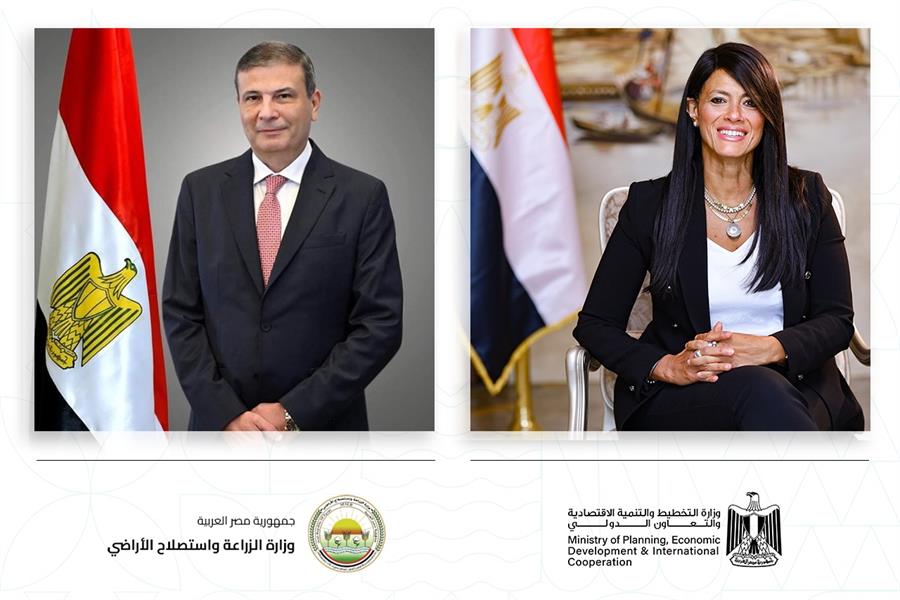Planning Minister Outlines Egypt’s Economic Growth Targets and Reforms at London Stock Exchange Seminar

21 April 2024
H.E. Dr. Hala El-Said, Minister of Planning and Economic Development and Chairperson of The Sovereign Fund of Egypt (TSFE),participated in a session titled “Overall Economic Trends in 2024” during a seminar held by the London Stock Exchange Group (LSEG). The seminar focused on Egypt’s future financial markets, challenges, and global and local economic indicators. The event was attended by Ayman Salim, the fund’s CEO, and managed by Yasmin Saleh, Editor-in-Chief of Zawya Arabic website.
In her speech, Dr. Hala El-Said emphasized the Egyptian government’s collaborative approach with the private sector, civil society, academics, and think tanks in launching plans and programs. She highlighted the government’s utilization of the COVID-19 pandemic period for societal dialogues with development partners to formulate a genuine structural reform plan. This plan focuses on three key economic sectors: industry, agriculture, and telecommunications and information technology, enhancing the Egyptian economy’s productivity and sustainable revenue from real sector exports.
El-Said added that Egypt boasts two competitive sectors: tourism and logistics, due to Egypt’s geographic location and infrastructure investments. These sectors are central to the structural reform plan, aiming to increase the weight of the three main sectors to 35% of growth volume, bolstering economic resilience. She noted that recent efforts have increased the relative weight from 25% to 30%, targeting 35% by the end of 2026, representing the medium-term in the reform plan.
She continued discussing the second axis of the structural reform plan, focusing on enhancing the private sector’s role as a key development partner. El-Said highlighted that targeted total investments for the current year exceed 2 trillion Egyptian pounds, within the framework of total economic indicators. She noted that private sector investments started at 27% three years ago, increased to 32%, and are targeted to reach 36% by year-end, and 48% in fiscal year 2024/2025.
El-Said pointed out the infrastructure deterioration following the January revolution, prompting significant state investments in infrastructure. Egypt now boasts an improved road network, numerous ports, and has transformed into a global logistics hub. She explained that state investment in infrastructure serves dual purposes: improving Egyptians’ quality of life by providing better services and meeting the private sector’s trade needs globally.
She elaborated on the state’s privatization plans, launching several companies and establishing the Egypt Sovereign Fund as a pivotal investment arm to encourage and support the private sector. El-Said also mentioned the establishment of a special committee for competitive neutrality to regulate the state-private sector relationship and determine competitiveness levels.
Discussing the third axis of the structural reform plan, El-Said highlighted the importance of labor market efficiency. She emphasized Egypt’s growing population and high youth percentage, underscoring the need for a dynamic labor market. El-Said announced the launch of the first labor market policy system in September, aiming to identify the labor market’s needed skills and specializations, enhance technical and vocational education, and develop the education system in partnership with the private sector.
El-Said mentioned the geopolitical challenges the region faces, with Egypt being most affected, impacting tourism during the first half of the year. She indicated that if tourism rates continue as in the first half, Egypt would achieve its highest rates, despite geopolitical crises. Therefore, the state focuses on diversifying tourism activities to maintain these rates. She also discussed exchange rate fluctuations’ impact on the industry sector in the first half, expecting industrial growth to reach 6% and agricultural growth to exceed 4%, alongside ongoing agricultural sector development.
El-Said addressed the telecommunications and information technology sector, contributing 16.5 to 17% to the economy. She explained its contribution to growth reached 3% and is targeted to reach 5%, driving growth rates higher.
Dr. Hala El-Said stated that the target was to achieve growth rates of up to 4% this year, but due to geopolitical changes, it is expected to reach between 2.9 to 3%. She added that next year targets a growth rate of 4.2%, emphasizing diversified growth across sectors and growth rates’ impact on employment. She clarified that unemployment rates reached 6.9%, targeting stability for the current and next year. She also mentioned logistic growth rates of 6.7%, with significant developments in the Suez Canal Economic Zone and various sectors in ports and transport.
El-Said explained that current exchange rate stability significantly contributed to the downward price trend, confirming that future cooperation with traders, chambers of commerce, industrial unions, along with the state’s intervention to supply more goods, and the central bank’s strict monetary policy will all contribute to curbing inflation. A decrease in inflation is expected in the next fiscal year.









